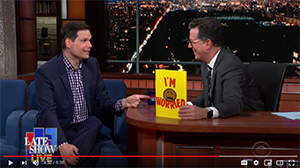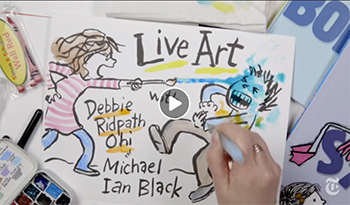One of the parts of filking I've always enjoyed is playing music with other people. Before I joined
Urban Tapestry, my sole instrument in the filk circle was the flute. I remember being incredibly nervous about it at first, not knowing (1) whether I was good enough to play along with other people and (2) if they wanted me to.
I've learned a lot about instrumental accompaniment over the years, and I'm still learning. Some things I've learned:
Don't assume it's ok to play along, even if it's just a casual filk circle. Some people prefer performing solo. Some may be very nervous, and your accompaniment could throw them off. I usually play it by ear. If it's someone I've never accompanied before, then I'll listen and watch first. If I think I can add an appropriate accompaniment and the performer seems confident, then I'll start noodling very quietly and watch the performer for a signal...a nod, for example, meaning that it's ok. I usually don't try accompanying people I don't know unless they seem to encourage other people in the circle to sing or play along.
Remember that you're backing up the main performer, not taking over. If you're playing while they're singing, make sure you're playing quietly enough that you don't drown out their words. Match the accompaniment to the performer and music -- if their style is simple, for example, ease off those impressive "twiddles" you've been dying to show off. The focus should be on the main performer, NOT you.
If there are other accompanists, give them room. If there's another flute or other melody instrument playing, I may opt not to play, especially if the person is someone known to accompany the performer on a regular basis. If it's more of a jam session with room for other accompanists, I listen to them and try to play around them. If they play high, I try playing low. If they play busy melodies, I stick to longer notes that complement rather than compete with theirs.
Remember that if someone is doing a piece a capella, they may actually prefer NO musical accompaniment. Some songs are traditionally sung a capella, and the feel of the music may change completely if you start strumming along on guitar. In my experience as a listener (others feel free to chime in!), I've noticed that most a capella singers don't seem to mind. Some, however, do. My tip: If you see someone singing a capella and you're aware that the individual IS capable of accompanying himself or herself, then it's likely the person is singing a capella on purpose. If you notice them shake their heads slightly when you start playing, STOP playing.
If unsure, don't play. If you're not sure if the performer minds or not, DON'T play. Ditto if you're not sure if your accompaniment is working with the piece.
Conversely, if you're a performer who doesn't mind people playing or singing along with you, do say so.
Practice: improve your craft
Pick a recording of some musician you like and try playing along. Record yourself playing against the music, and then listen to see how well you're doing.
Advice from other musicians:
Heather Rose Jones:
"It depends. When I'm accompanying on the harp, I have three basic modes: a "walking bass" type line (especially good with blues-type tunes); rhythmic chording (works only on songs with fairly "folk style" chords -- no accidentals); or a melody/descant line. (I'm not quite up to doing more than one mode at a time when I'm improvising.) On the flute, I tend to vary it a lot more within a piece: start out with some fairly slow-moving bass to get settled into the key and chord progression (and to have a chance for the performer to warn me off, if they want, without it being a big deal); move on into some melody and parallel harmonies; and then work up a little descant if the tune calls for it. If there are other accompanists, I'll spend more time going back to the moving bass to leave more "room" for others to play in, and I generally avoid doing more than maybe half a verse on melody, since there isn't much musical point to it, usually. Once in a blue moon, if the piece is right and the performer gives me the nod, I've had a chance to do a bit of serious soloing. Heaven. But as far as I'm concerned, that's purely the performer's call. I'm a lot more comfortable doing fancy stuff on the flute than on the harp -- it's my first instrument, and I don't have to think much while I'm playing it."
Jeff Bohnhoff:
"I tend to jump in very infrequently. I will do it if the performer is someone I know, and I am absolutely certain that they won't mind, or if they have asked me to play along in advance. Even then, I'll only play something if I feel that it can add something and not detract from the song or performer. I almost never play along with someone I don't know. If you do play along, it's *not* OK if what you are playing is taking attention away from the performer and/or the song."
Joe Bethancourt:
"I try to do the same sort of accompaniment that I would do for myself: to embellish and add to the lyric line and vocals. I try to keep away from what the performer of the song is doing on their instrument, and re-enforce their instrumental line.
Don't try to accompany folks who are "star-struck" over themselves. (I name no names ..... ) If it is obviously beyond your capacity, don't try. Learn to hear the chordal changes. Learn basic chordal patterns. Learn to find keys by ear. Let their instrument have priority of sound. Don't overpower their voice. Keep it simple.
(can you tell I do this professionally?)
Common chordal patterns:
I vi IV V (C Am F G)
vi V (Am G common in Irish music)
I iii IV V (C Em F G)
and so forth..... each style has a distictive chordal pattern, and many writers use a preferential pattern very commonly, for example Leslie Fish."
Comments? Suggestions? Please post below.
 Friday, February 29, 2008 at 9:09AM
Friday, February 29, 2008 at 9:09AM  Friday, February 29, 2008 at 9:09AM
Friday, February 29, 2008 at 9:09AM  Basics,
Basics,  Conventions
Conventions  Basics,
Basics,  Conventions
Conventions 







